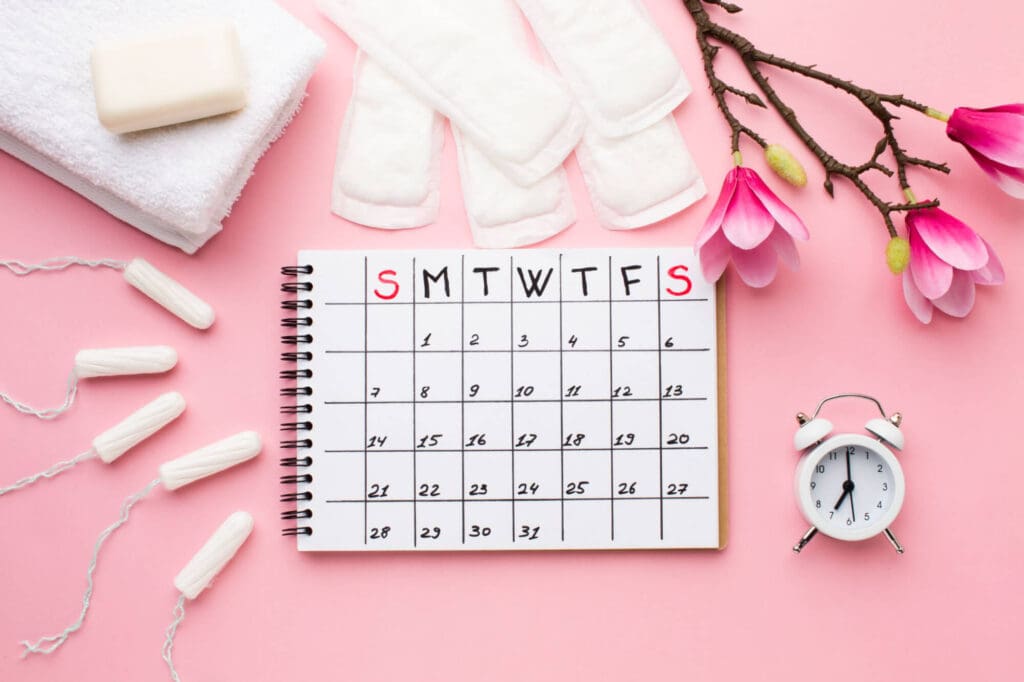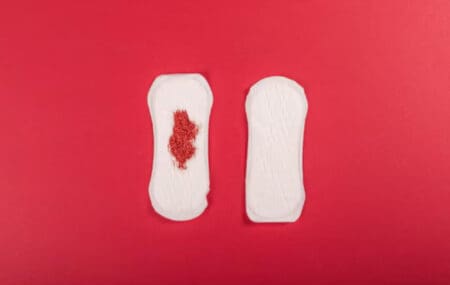
Why is My Period Late? Common Causes and What to Do
A late period can be confusing, even stressful. Often, if sexually active, pregnancy is the first thing that comes to mind. But there are many other reasons a period might be delayed. Whether it’s stress, lifestyle changes, or underlying medical conditions, a late period doesn’t necessarily mean something is wrong. Let’s explore some common reasons why your period might be late and what you can do about it.
Is my period late?
Determining if your period is late can be tricky. This is especially if you’re unsure about your average cycle length or can’t remember the date of your last period. To check: try marking the first day of your last period. If you can recall the first days of your last three periods, this will be especially helpful. Then, count the days from the start of one period to the start of the next to find your average cycle length. Knowing this can help you identify when your period is late. If you’re already tracking your cycle, you likely have a good idea of when it should arrive!
P.s. subscribe to our newsletter to be the first to know when the taahirah app launches!
What might be causing my period to be late?
Pregnancy
Pregnancy, of course, is one of the most common causes of a missed period. If you’ve engaged in any sexual activity that could result in pregnancy, and your period is over 10 days late, it’s a good idea to take a pregnancy test. At-home tests detect the hormone hCG, which is present in the urine when you’re pregnant.
What to do: If the test confirms pregnancy, your healthcare provider can offer guidance and support to help you navigate this new stage. We recommend visiting the NHS website, which provides excellent resources on pregnancy and what to expect.
If pregnancy isn’t the cause of your late period, but you haven’t experienced a period for over 90 days, it’s also wise to consult with a healthcare provider. They can help you explore other potential reasons for a delayed period, and work with you to find solutions.
Breastfeeding
Many breastfeeding mothers experience delayed or missed periods. Prolactin, the hormone that supports milk production, can suppress ovulation, which in turn can cause your periods to be irregular or absent.
What to do: This is completely normal for breastfeeding women. Once you reduce or stop breastfeeding, your cycle should return to normal.
Perimenopause
Perimenopause is the transition period leading up to menopause and typically affects women between the ages of 45 and 55. During this time, your hormone levels begin to fluctuate, leading to changes in your menstrual cycle, such as irregular or missed periods. Over time, your periods will stop altogether as you enter menopause.
If you’re under 45 and experiencing symptoms like irregular periods or other hormonal changes, it’s important to seek medical advice, as this could indicate early menopause.
What to do: For those over 45, if you’re experiencing symptoms of perimenopause, such as hot flashes or mood swings, and suspect this might be the cause of your missed period, it’s a good idea to talk to your healthcare provider. They can help you explore effective ways to manage this stage of life and discuss what to expect as your body transitions.
Stress and emotional wellbeing
Stress is another common reason for a delayed period. When you’re emotionally or physically stressed — whether from work, relationships, or a big life event — it can disrupt the hormonal signals that regulate your cycle. When we’re stressed, our body activates the “fight or flight” response. This triggers high levels of the stress hormone, cortisol, which can interfere with the hypothalamus – the part of your brain that helps control reproductive hormones. A helpful strategy is to notice when this happens and intentionally shift back to a state of calm.
What to do: Try incorporating stress-relieving activities such as dhikr, guided imagery, deep breathing, or journalling. These small acts of self-care can help restore hormonal balance. Additionally, tracking lifestyle factors like stress levels, deadlines, or significant events in your life can help you identify patterns and understand how they might be affecting your cycle. If stress becomes overwhelming, seeking support from a professional can be a valuable step in managing your emotional and physical health.
Islamic insight: Islam places high value on mental health and emotional wellbeing. Through prayer, we are given five daily pauses to reflect and reconnect. Outside of ṣalāh, dhikr (remembrance of Allah) and reciting the Qur’ān can further restore balance and tranquillity. The Qur’ān consistently guides those facing emotional distress and directs them towards a life of meaning and peace. Allah assures us: “Allah does not burden any soul with more than it can bear. Allah will grant, after hardship, ease” (Qur’an 65:7).
The Prophet ﷺ also shared a powerful duʿā for relieving stress and sadness: “O Allah, I am Your servant, the child of Your servant, the child of Your female servant. My forelock is in Your hand; Your command over me prevails, and Your decree about me is just. I ask You by every name You have named Yourself with, revealed in Your Book, taught to any of Your creation, or kept in Your knowledge of the unseen, to make the Qur’an the spring of my heart, the light of my chest, the remover of my sorrow, and the reliever of my anxiety.”
This duʿāʾ promises comfort and joy from Allah, lifting every grief from the believer’s heart. It encourages us to draw closer to the Qur’an, which serves as a guide and a healing source, for “surely, in the remembrance of Allah do hearts find rest” (Qur’an 13:28).
Changes in weight
Significant weight loss or gain can also affect your period. Rapid changes can impact your body’s ability to produce the right amount of oestrogen, a hormone essential for regulating your menstrual cycle. If you’re underweight, your body may not produce enough oestrogen to maintain a regular period. Conversely, being overweight can result in an excess of oestrogen, disrupting ovulation and leading to a missed period.
What to do: Aim to maintain a healthy, balanced diet and a regular exercise routine to help stabilise your cycle. If weight management is hard to manage, consider speaking to a nutritionist or healthcare provider. They can offer guidance to help you feel your best.
Islamic insight: When we are born, we are gifted with our bodies. It becomes our responsibility to care for them as a form of gratitude and remembrance of Allah. In doing so, Islam advises moderation in all things. The Prophet Muhammad ﷺ encouraged moderation. One simple tip is to: “leave one-third for food, one-third for water, and one-third for air” (Tirmidhī). When it comes to choosing the best diet, simplicity is key. You can explore more about nourishing foods and healthy choices here. The same principle applies to physical exercise – maintaining balance and consistency can help keep the body healthy and strong.
Over-exercising
Intense exercise routines, particularly those adopted suddenly, can delay or stop your period altogether. This is especially common in athletes or those training for endurance sports. Excessive physical activity can reduce oestrogen levels, causing your body to stop ovulating as a way to conserve energy.
What to do: If you’ve started a new workout regimen, try easing back to give your body time to adjust. A balanced exercise plan, along with proper nutrition, can help keep your menstrual cycle regular.
Hormonal birth control
Hormonal contraceptives, like birth control pills, patches, IUDs, or injections, can alter your cycle and may even cause a lighter or missed period. This is normal for many people on hormonal birth control. After discontinuing birth control, it can take several months for your cycle to regulate again.
What to do: If you’re concerned about changes to your cycle, check in with your healthcare provider. They can help you understand whether your birth control method is still right for you.
Islamic insight: Keeping a log of your menstrual cycle can help track changes and support you in fulfilling Islamic obligations, such as prayer and fasting. This will help you notice patterns in your cycle, and can be particularly helpful if your cycle has become irregular.
Illness or Medical conditions
Short-term illnesses like the flu, or chronic conditions such as diabetes or celiac disease, can also affect your cycle. When the body is fighting off an infection or illness, it prioritises healing over reproductive functions, which can result in a delayed or missed period.
What to do: Once you recover, your cycle should return to normal. If your period continues to be irregular, speak to your healthcare provider.
Polycystic Ovary Syndrome (PCOS)
PCOS is a common condition that affects a woman’s hormonal balance. Women with PCOS often produce higher levels of androgens (male hormones), which can interfere with ovulation and result in longer or skipped menstrual cycles.
What to do: PCOS can be managed with a combination of lifestyle changes, medications, and treatments for specific symptoms. You can learn more here. If you suspect PCOS, it’s important to talk to a healthcare professional for diagnosis and treatment.
Thyroid disorders
Thyroid hormone imbalances — whether it’s an overactive thyroid (hyperthyroidism) or an underactive thyroid (hypothyroidism) — can interfere with your menstrual cycle. Thyroid hormones regulate many bodily functions, including metabolism and menstruation, so any imbalance in thyroid levels can cause late or missed periods.
What to do: A simple blood test can check for thyroid imbalances, and medications can help restore normal thyroid function and regularity in your periods.
Medications
Certain medications, such as antidepressants, antipsychotics, or chemotherapy drugs can interfere with your menstrual cycle. These medications may alter the levels of hormones in your body, leading to a delayed or missed period.
What to do: If you think your medication is affecting your cycle, consult your doctor. They may adjust your prescription or recommend alternatives that won’t interfere with your periods.
Primary Ovarian Insufficiency (POI)
POI, sometimes called premature ovarian failure, occurs when the ovaries stop working properly before the age of 40. Unlike early menopause, POI can sometimes result in intermittent periods and even pregnancy.
What to do: If your periods have been irregular for four months or more and you suspect POI, consult your healthcare provider. They can run tests and discuss treatment options.
When to see a doctor
A late period once in a while is usually nothing to worry about, especially if you’ve been under stress or experiencing lifestyle changes. However, if your period is consistently late or absent for more than three months, or if you’re experiencing other symptoms like severe pain, unusually heavy bleeding, or changes in discharge, it’s important to see a healthcare provider. They can help diagnose any underlying issues and guide you towards appropriate treatment.
Tracking your cycle using Taahirah app can also help you spot changes early and provide valuable information to your doctor! Remember that your menstrual health is an important part of your overall well being.
Reviewed by Dr Mahnur

